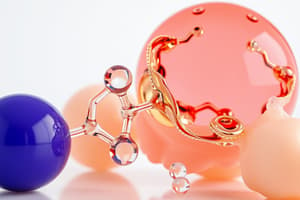Podcast
Questions and Answers
What type of forces occur between an ion and polar molecules?
What type of forces occur between an ion and polar molecules?
- London Dispersion Forces
- Ion-Dipole Forces (correct)
- Hydrogen Bonds
- Dipole-Dipole Forces
Which intermolecular force involves the attraction between the positive end of one molecule and the negative end of another?
Which intermolecular force involves the attraction between the positive end of one molecule and the negative end of another?
- Dipole-Dipole Forces (correct)
- Ion-Dipole Forces
- London Dispersion Forces
- Hydrogen Bonds
Which type of interaction involves a hydrogen atom bonded to an electronegative atom like oxygen?
Which type of interaction involves a hydrogen atom bonded to an electronegative atom like oxygen?
- Hydrogen Bonds (correct)
- London Dispersion Forces
- Dipole-Dipole Forces
- Ion-Dipole Forces
What are London Dispersion Forces also known as?
What are London Dispersion Forces also known as?
Which intermolecular force influences the state of matter a substance will be in at a given temperature?
Which intermolecular force influences the state of matter a substance will be in at a given temperature?
Between what types of molecules do Dipole-Dipole Forces arise?
Between what types of molecules do Dipole-Dipole Forces arise?
What type of bond involves the transfer of electrons between a metal and a non-metal?
What type of bond involves the transfer of electrons between a metal and a non-metal?
In which type of bond are electrons shared between non-metal atoms?
In which type of bond are electrons shared between non-metal atoms?
What type of bond is found in metals where electrons are delocalized over a lattice of metal ions?
What type of bond is found in metals where electrons are delocalized over a lattice of metal ions?
Which property is influenced by the strength of intermolecular forces and tends to be higher in substances with strong intermolecular bonding?
Which property is influenced by the strength of intermolecular forces and tends to be higher in substances with strong intermolecular bonding?
What determines the ability of a substance to dissolve in another?
What determines the ability of a substance to dissolve in another?
How do scientists use their understanding of intermolecular forces in real-world applications like creating superhydrophobic surfaces?
How do scientists use their understanding of intermolecular forces in real-world applications like creating superhydrophobic surfaces?
What type of intermolecular force occurs between an ion and polar molecules?
What type of intermolecular force occurs between an ion and polar molecules?
Which type of intermolecular force is a special case of dipole-dipole interactions involving a hydrogen atom bonded to an electronegative atom?
Which type of intermolecular force is a special case of dipole-dipole interactions involving a hydrogen atom bonded to an electronegative atom?
In which type of molecules do London Dispersion Forces become more significant?
In which type of molecules do London Dispersion Forces become more significant?
What type of forces arise between polar molecules where the positive end of one attracts the negative end of another?
What type of forces arise between polar molecules where the positive end of one attracts the negative end of another?
Which intermolecular force plays a role in affecting the boiling and melting points of substances?
Which intermolecular force plays a role in affecting the boiling and melting points of substances?
What is the main difference between ionic bonds and covalent bonds?
What is the main difference between ionic bonds and covalent bonds?
How do metallic bonds differ from ionic and covalent bonds?
How do metallic bonds differ from ionic and covalent bonds?
What property of a substance is directly affected by the strength of intermolecular forces?
What property of a substance is directly affected by the strength of intermolecular forces?
Which factor mainly influences the phase changes of a substance?
Which factor mainly influences the phase changes of a substance?
How do substances with strong intermolecular forces behave in terms of solubility?
How do substances with strong intermolecular forces behave in terms of solubility?
What type of bond is primarily responsible for the conductivity and malleability of metals?
What type of bond is primarily responsible for the conductivity and malleability of metals?
What property of substances is determined by the strength of intermolecular forces relative to molecular kinetic energy?
What property of substances is determined by the strength of intermolecular forces relative to molecular kinetic energy?
Which type of bond involves electrons being shared between non-metal atoms?
Which type of bond involves electrons being shared between non-metal atoms?
What effect do substances with strong intermolecular forces have on their boiling and melting points?
What effect do substances with strong intermolecular forces have on their boiling and melting points?
Which property is affected by the similarity in the type of intermolecular forces between a solute and solvent?
Which property is affected by the similarity in the type of intermolecular forces between a solute and solvent?
In which type of substances do molecules exhibit strong dipole moments influencing their behavior?
In which type of substances do molecules exhibit strong dipole moments influencing their behavior?
What determines the ability of substances to dissolve in each other?
What determines the ability of substances to dissolve in each other?
Which interatomic force influences the viscosity and surface tension of substances?
Which interatomic force influences the viscosity and surface tension of substances?
What is the main factor governing the physical state transitions of substances at different temperatures?
What is the main factor governing the physical state transitions of substances at different temperatures?
What type of bond leads to the formation of ions that attract each other due to electron transfer between atoms?
What type of bond leads to the formation of ions that attract each other due to electron transfer between atoms?
What type of intermolecular force becomes more significant in larger, heavier atoms and molecules?
What type of intermolecular force becomes more significant in larger, heavier atoms and molecules?
Which intermolecular force is a special case of dipole-dipole interactions involving a hydrogen atom bonded to a highly electronegative atom?
Which intermolecular force is a special case of dipole-dipole interactions involving a hydrogen atom bonded to a highly electronegative atom?
What type of intermolecular force occurs between an ion and the polar molecules in a substance, affecting the solubility of ionic compounds in polar solvents?
What type of intermolecular force occurs between an ion and the polar molecules in a substance, affecting the solubility of ionic compounds in polar solvents?
Which intermolecular force influences the unique properties of water due to the attraction between a hydrogen atom and an electronegative atom like oxygen?
Which intermolecular force influences the unique properties of water due to the attraction between a hydrogen atom and an electronegative atom like oxygen?
In what type of molecules do dipole-dipole forces arise, with one molecule's positive end attracting another molecule's negative end?
In what type of molecules do dipole-dipole forces arise, with one molecule's positive end attracting another molecule's negative end?
Which intermolecular force is responsible for affecting the boiling and melting points of substances?
Which intermolecular force is responsible for affecting the boiling and melting points of substances?
What type of forces are crucial for determining the physical properties of substances by acting between molecules?
What type of forces are crucial for determining the physical properties of substances by acting between molecules?
Which intermolecular force is a special case of dipole-dipole interactions and occurs when a hydrogen atom is bonded to an electronegative atom?
Which intermolecular force is a special case of dipole-dipole interactions and occurs when a hydrogen atom is bonded to an electronegative atom?
Which forces become more significant in larger, heavier atoms and molecules, including non-polar ones?
Which forces become more significant in larger, heavier atoms and molecules, including non-polar ones?
Among polar molecules, which intermolecular force involves the positive end of one molecule attracting the negative end of another?
Among polar molecules, which intermolecular force involves the positive end of one molecule attracting the negative end of another?
What type of bond occurs between non-metals with electrons shared between atoms?
What type of bond occurs between non-metals with electrons shared between atoms?
Which intermolecular force influences the boiling and melting points of substances due to the presence of hydrogen bonding?
Which intermolecular force influences the boiling and melting points of substances due to the presence of hydrogen bonding?
What type of bond is found in metals where electrons are delocalized over a lattice of metal ions?
What type of bond is found in metals where electrons are delocalized over a lattice of metal ions?
Which property is influenced by the strength of intermolecular forces and increases in substances with strong intermolecular bonding?
Which property is influenced by the strength of intermolecular forces and increases in substances with strong intermolecular bonding?
"Solubility" refers to the ability of a substance to:
"Solubility" refers to the ability of a substance to:
"Phase Changes" in substances depend on the strength of what relative to the kinetic energy of the molecules?
"Phase Changes" in substances depend on the strength of what relative to the kinetic energy of the molecules?
"Surface Tension" is influenced by the strength of which forces?
"Surface Tension" is influenced by the strength of which forces?
"Metallic Bonds" contribute to properties like conductivity and malleability due to what characteristic?
"Metallic Bonds" contribute to properties like conductivity and malleability due to what characteristic?
"Real-world applications" of understanding intermolecular forces can lead to the design of new materials, drugs, solutions for environmental issues, and technological innovations. What is one specific outcome mentioned in the text?
"Real-world applications" of understanding intermolecular forces can lead to the design of new materials, drugs, solutions for environmental issues, and technological innovations. What is one specific outcome mentioned in the text?
"Boiling and Melting Points" are higher in substances with strong intermolecular forces. Which force is specifically mentioned as contributing to this increase in boiling and melting points?
"Boiling and Melting Points" are higher in substances with strong intermolecular forces. Which force is specifically mentioned as contributing to this increase in boiling and melting points?
What type of intermolecular force becomes more significant in larger, heavier atoms and molecules, including non-polar ones?
What type of intermolecular force becomes more significant in larger, heavier atoms and molecules, including non-polar ones?
Which intermolecular force involves the attraction between the positive end of one molecule and the negative end of another?
Which intermolecular force involves the attraction between the positive end of one molecule and the negative end of another?
What influences the phase changes of a substance mainly?
What influences the phase changes of a substance mainly?
Which interatomic force influences the viscosity and surface tension of substances?
Which interatomic force influences the viscosity and surface tension of substances?
In what type of molecules do Dipole-Dipole Forces arise?
In what type of molecules do Dipole-Dipole Forces arise?
What property of a substance is directly affected by the strength of intermolecular forces?
What property of a substance is directly affected by the strength of intermolecular forces?




